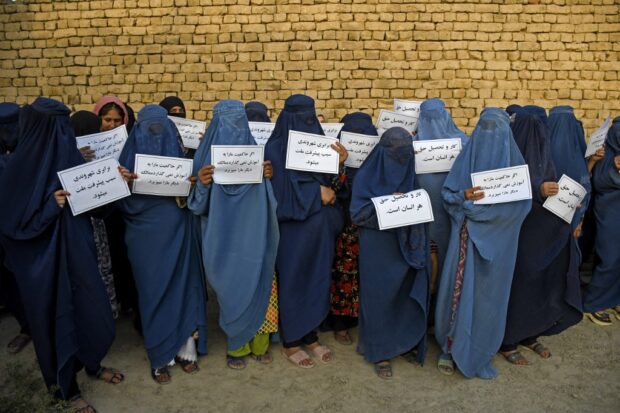
Afghan burqa-clad women hold placards as they protest for their right to education, in Mazar-i-Sharif on August 12, 2023. (Photo by Atef Aryan / AFP)
United Nations, United States — Engineering student Somaya Faruqi had to flee Afghanistan to continue her studies after the Taliban government returned to power two years ago and banned more than 1.1 million girls and women from schools and universities.
The 21-year-old, now living in the United States, is the face of a campaign launched Tuesday by the UN’s Education Cannot Wait global fund to combat the crisis, marking the two-year anniversary of the fall of the internationally recognized government in Kabul.
Under the motto #AfghanGirlsVoices, the operation is spearheading a global call to respect all Afghan girls’ and women’s right to education.
Countless girls and women have already had to leave the country to continue their education.
Faruqi, for example, finished high school in Qatar after she and nine other girls from her robotics team, “The Afghan Dreamers” left Afghanistan in 2021.
Now, she is beginning her second year studying engineering at Sacramento State university in California, thanks to a scholarship from Qatar.
A woman dresses up her child at a hospital in Bamiyan, Afghanistan, March 2, 2023. Since taking over in 2021, Taliban authorities have barred women from universities and most charity jobs, but they have made exemptions in the healthcare sector, such as the trainee midwife program that has been spearheaded by the U.N. refugee agency (UNHCR) with a local NGO, where young women train for two years in the provincial capital hospital as midwives, after which they will return home to help the women in the community. “When the roads are blocked of course there are no means of transportation, people even use donkeys to move the patients to the clinic centres, but sometimes there is not even the opportunity for that,” said Mohammad Ashraf Niazi, the head of UNHCR’s Bamiyan office. “These students can help in each village, in each district with deliveries.” REUTERS/Ali Khara
‘Forgotten’
“This campaign is meant to bring the attention of the world again to the girls in Afghanistan, and (their) education issues,” Faruqi told AFP by telephone.
“Afghanistan seems to be forgotten,” she added.
The near-total exclusion of women from Afghan public life, including in education and employment, has become one of the major sticking points preventing the international community from offering aid and official recognition to the Taliban government.
“The path to any more normal relationship between the Taliban and other countries will be blocked unless and until the rights of women and girls, among other things, are actually supported,” US Secretary of State Antony Blinken told reporters in Washington.
Conditions for women and girls in Afghanistan are the “worst globally,” a UN report found last month, saying that the Taliban government’s policies — which are based on their strict interpretation of Islam — could amount to a “gender apartheid.”
In fact, the state of women’s rights in Afghanistan “should count as a crime against humanity, and it should be prosecuted by the International Criminal Court,” the UN special envoy for global education, former British Prime Minister Gordon Brown, told reporters during a video meeting Tuesday.
(FILES) Afghan school girls attend at an open air primary school in Khogyani district of Nangarhar province on May 14, 2023. Since their return to power in Afghanistan two years ago, the Taliban have blocked access to secondary and university education for over 1.1 million young Afghan women, according to the UN. (Photo by Shafiullah KAKAR / AFP)
‘Tragic’
In 2021, only one month after returning to power for the first time in 20 years, the Taliban authorities banned girls from attending secondary school, before closing university doors to them in December 2022 and then heavily restricting their participation in the workforce.
For Faruqi, these circumstances cannot stand: “We have to make sure that (girls and women) have access to equal opportunities, and they have access to education, because education is the key to freedom,” she told AFP.
“Girls have been banned from public spaces: schools, gyms, parks; there is nothing allowed for them to do; just to stay at home,” she explained in a UN statement Tuesday.
For many families, the only path forward for their daughters is marriage, “regardless of their consent,” she told AFP, adding that many of her own classmates have been forced to marry.
“Depression is widespread. The rate of suicide for girls has gone up a lot in the last two years. It is tragic,” she said in the statement.
The Education Cannot Wait campaign will aim to raise global awareness of the issue via social media into next month, amplifying the voices of Afghan girls and women just as world leaders gather for the UN General Assembly September 18 and 19.